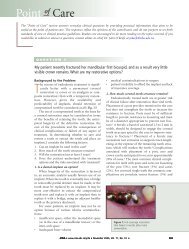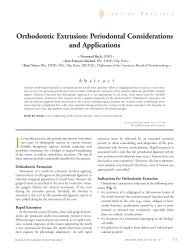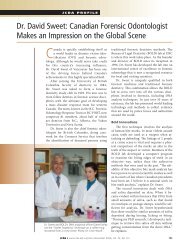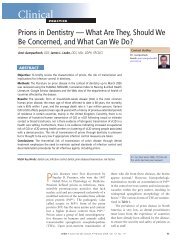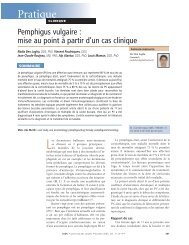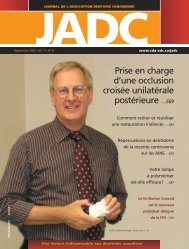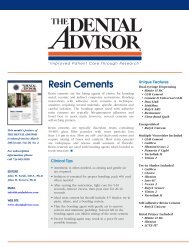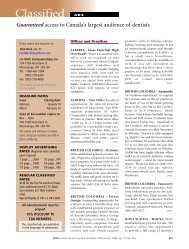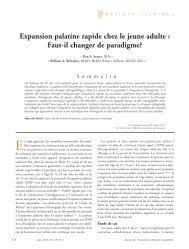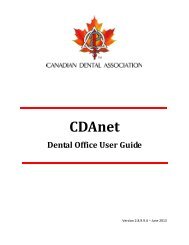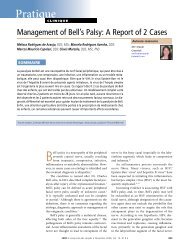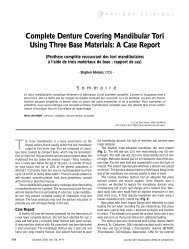JCDA - Canadian Dental Association
JCDA - Canadian Dental Association
JCDA - Canadian Dental Association
Create successful ePaper yourself
Turn your PDF publications into a flip-book with our unique Google optimized e-Paper software.
CDA: Working with<br />
Industry<br />
CDA continues to build solid relationships with the<br />
dental industry. Here are a few examples of recent<br />
joint activities:<br />
Lab Track: Study of Dentist Satisfaction with<br />
<strong>Dental</strong> Laboratory Services<br />
Work proceeds on CDA’s ongoing survey of dentists’<br />
satisfaction with the service offered by dental laboratories.<br />
Some 665 responses were received, providing enough data<br />
to produce useful results for participating laboratories. This<br />
is a regional study, given the size of the participating laboratories.<br />
Three dental laboratories have committed to funding<br />
the project. Reports will be finalized by December.<br />
<strong>Dental</strong> Product Distribution (DPD) Track<br />
Update<br />
The DPD Track research study has been completed,<br />
yielding new data about buying trends and customer satisfaction<br />
with products and suppliers. Confidential reports<br />
were presented to participating dental product distributors.<br />
Plans for DPD Track II have started. This second study<br />
may deal with the grey market.<br />
Sponsorship<br />
Among this year’s sponsors of CDA activities were Ash<br />
Temple, <strong>Canadian</strong> <strong>Dental</strong> Service Plans Inc. (CDSPI),<br />
CareCredit, Colgate, the Dentistry Canada Fund, Kodak,<br />
Nobel Biocare, Oral-B, Patterson, Pfizer Canada, Procter<br />
and Gamble, and Septodont.<br />
National Oral Health Month<br />
CDA partnered with Colgate in a very successful<br />
campaign during National Oral Health Month 2003.<br />
Plans are well underway for the 2004 campaign.<br />
Public Education Campaign<br />
CDA is exploring partnerships with several organizations<br />
in a public education campaign that will communicate<br />
oral health and general health messages to a national<br />
audience. ■<br />
Journal of the <strong>Canadian</strong> <strong>Dental</strong> <strong>Association</strong><br />
CDA: Year in Review<br />
Helping CDA Formulate<br />
Public Policy<br />
CDA’s Resource Centre is more than a library. Under<br />
Costa Papadopoulos, manager of health policy and<br />
information, the centre is playing a key role in<br />
formulating public policy and maintaining the long-term<br />
viability of the dental profession.<br />
The Resource Centre is helping CDA’s Board of<br />
Directors make knowledge-based decisions on matters of<br />
policy, by providing a firm foundation of detailed, accurate<br />
and sourced information.<br />
When CDA’s government relations team needed to<br />
know how much money was being spent on oral health<br />
research in Canada, Mr. Papadopoulos uncovered information<br />
from the <strong>Canadian</strong> Institutes of Health Research,<br />
showing clearly that the level of funding was far too low.<br />
Well-researched presentations also serve as a<br />
springboard for discussion in matters of policy.<br />
Mr. Papadopoulos provided data for Dr. John O’Keefe’s<br />
presentation on oral health promotion at last September’s<br />
Strategic Forum in Ottawa. During the discussion<br />
segment, some delegates expressed surprise at the unexpected<br />
research findings.<br />
“Dentists need more information on the costbenefit<br />
analysis of oral health promotion campaigns,”<br />
Mr. Papadopoulos explains. “My research shows that early<br />
childhood dental awareness campaigns do not translate<br />
into regular dental visits later on in life. More research is<br />
also needed to help dental insurers make the right decisions.<br />
Their decisions are sometimes based on risk aversion<br />
or emotion, and not always on the facts.”<br />
Many questions need to be answered more clearly and<br />
assumptions proven right or wrong. Mr. Papadopoulos<br />
cited examples: “How much is saved from early health<br />
promotion? Will it reduce the need for a complicated<br />
procedure later on? Is there a definite link between oral<br />
health and general health? Between plaque and cardiovascular<br />
disease? This is the kind of data that must be collected<br />
and disseminated to major players. It is bound to have an<br />
impact on future public health policy.”<br />
Mr. Papadopoulos cautioned that some of his datagathering<br />
work would only have a long-term payoff for the<br />
profession. “It may lead to government programs for<br />
dentists in 10 or 20 years’ time,” he said. ■<br />
November 2003, Vol. 69, No. 10 647



